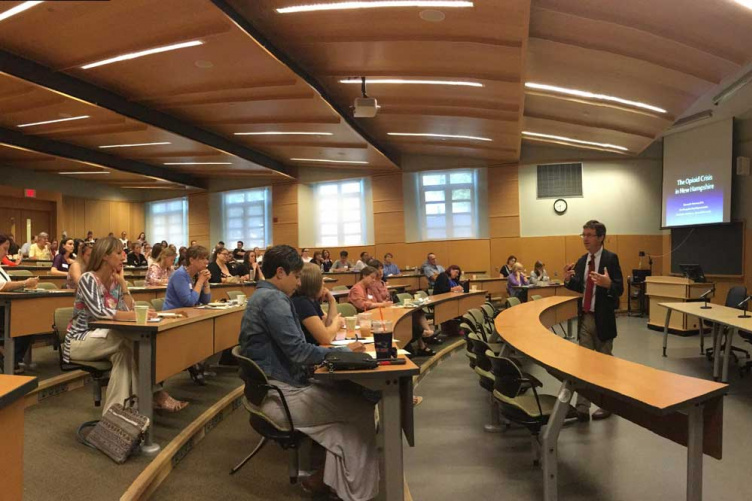
Dr. Thomas Sherman, a member of the New Hampshire House of Representatives, presents at the recent nursing department symposium, "Spotlight on the Opioid Crisis." (Photo: Callie Carr, College of Health and Human Services)
Four years ago, if you had asked Dr. Thomas Sherman, a practicing gastroenterologist and a representative in the New Hampshire Legislature, if he’d eventually have a part in fighting the opioid crisis in the state, he would have said no.
But for Sherman and many others in the Granite State, that changed rapidly.
Everyone has a role to play in stemming the tide of drug addiction, and the best way to combat addiction is through a collaborative, community-based response.
That was Sherman’s message for students, clinicians and other attendees at the department of nursing’s annual clinical symposium on Tuesday, Aug. 23. Titled “Spotlight on the Opioid Crisis,” the symposium brought together healthcare providers, community leaders and university students and faculty for a daylong discussion on how to treat opioid addiction in the Granite State.
“I want you to think about what your next step is — personally and professionally — in your neighborhood, in your family and in your practice, to start working on the opioid crisis,” Sherman said during his keynote address.
The symposium was the latest step in the nursing department’s efforts to combat opioid addiction.
“We should have a central role in educating our nurses and nurse practitioners to get involved in finding solutions for the opioid crisis,” said Donna Pelletier, clinical associate professor of nursing and one of the event’s organizers.
The symposium was the culmination of the department’s goal of addressing the opioid crisis across all of its programs during the 2015-2016 academic year, Pelletier said.
“It hits home with students and faculty. Everyone knows someone affected by addiction,” she added.
State officials are projecting approximately 482 opioid-related overdose deaths in 2016, a 9-percent increase from 2015, Sherman told attendees.
“Every county in the state has a problem … and everybody is involved,” he said.
And that means there are plenty of roles to fill. Sherman talked about the opioid crisis from his perspective as a practicing physician and lawmaker. The state is making strides, Sherman said, pointing to recent pieces of legislation that have made it easier for people to receive treatment for substance abuse, strengthened the state’s Prescription Drug Monitoring Program and increased access to Narcan, a drug that counteracts the effects of an opioid overdose.
Plenty of policy work remains, according to Sherman. While the New Hampshire Health Protection Program has increased access to treatment for low-income residents, state funding and resources remain scarce.
“In New Hampshire, we’re ranked 49th in the nation in terms of people who need treatment actually receiving it and 49th in funding, and we’re ranked third for rates of addiction and overdoses,” he said. “We’re at the top where we shouldn’t be and at the bottom where we shouldn’t be.”

Larry Clow)
Reversing that means changing attitudes about addiction, and during the symposium, Robert Mair, professor of psychology, presented an overview on the neuroscience behind addiction that examined the complex changes that occur once addiction takes hold.
According to the nursing department’s Pelletier, discussions about science and health policy are a complementary part of the department and the university’s mission. “We want our students actively engaged in health policy,” she said. “We’re out in the community all the time, as are other programs at UNH, and through grass-roots efforts and legislation, we’re really able to affect changes in health policy.”
Grass-roots initiatives and community engagement were a prominent theme for the day.
Kathryn Davis of Catholic Medical Center in Manchester, Megan Baston of Elliot Hospital in Manchester and Jason Lucey of Wentworth-Douglass Hospital in Dover took part in an interdisciplinary panel on local responses to the opioid crisis. Lucey is involved in a number of addiction treatment initiatives on the Seacoast, including a pair of recovery centers set to open in Durham and Rochester.
“It’s going to take the whole village — we as healthcare providers need to step out of the exam room and start working with patients beyond those 15-minute visits,” Lucey said.
That community spirit was on display as the symposium ended. The day’s final presentation was from nurse Kerry Norton, Dr. Colene Arnold and Abi Lizotte, who are working together to open Hope on Haven Hill, a recovery center based in Rochester that will help pregnant women with addiction. Hope on Haven Hill will open in October, Pelletier said.
By the end of the presentation, students and clinicians were “signing up left and right to help out.”
“We want our students to give back to the community, to use the knowledge they have,” Pelletier said. “We want to see that they’re out there and making a difference.”
-
Written By:
Larry Clow '12G | UNH Cooperative Extension
















































